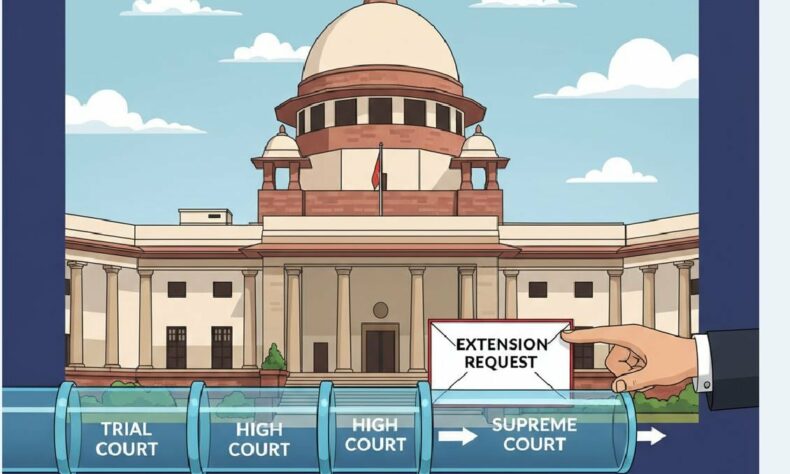
By Dr Swati Jindal Garg
Reasserting that “there is a place for everything, and everything must be in its place,” the Supreme Court has once again pulled up trial judges for addressing requests directly to the apex court
seeking extensions of time to complete trials. The Court emphasised that such communication must route strictly through the concerned High Court, in line with established judicial procedure.
In a recent case highlighting procedural lapses in the subordinate judiciary, a division bench of Justices JK Maheshwari and K Vinod Chandran expressed strong dissatisfaction after a trial court judge independently filed an application before the Supreme Court. The application sought additional time to conclude a family dispute matter that the top court had earlier directed to be completed within six months.
Not only was the request sent through an improper channel, the affidavit itself lacked basic particulars. This prompted the bench to examine whether a trial court could bypass regular administrative hierarchy and directly approach the Supreme Court—a question the judges answered resoundingly in the negative.
Upon inquiry, the bench learned that the trial court judge had indeed sidestepped the High Court. Justice Maheshwari observed the potential dangers of such a practice becoming routine, noting: “How do we entertain all these letters?… If the judge is asking for an extension, he should have advised the district judge, and the district judge should have sent it to the
portfolio judge… Otherwise, how is this appropriate?”
The bench reaffirmed its earlier ruling in Durgawati @ Priya vs CBI, reiterating that when the Supreme Court issues directions for time-bound disposal, it is the High Court’s registry that must supervise progress. Any request for extension can be granted only upon satisfaction of the supervisory authority and must then be forwarded to the Supreme Court by the registrar general or registrar judicial. Despite previous directions for High Courts to create Standard Operating Procedures on such communications, it appears that uniform compliance is still lacking.
Refusing to entertain the irregular application, the Supreme Court directed that a fresh, complete affidavit be filed through the registrar general of the concerned High Court, making it clear that trial courts cannot directly seek extensions from the apex court.
WHEN DEADLINES CONFUSE THE COURTS
This is not the first time subordinate courts have misread the Supreme Court’s time-bound directions. In an earlier case, a magistrate declared that he had “ceased to have jurisdiction” after the Supreme Court’s six-week disposal deadline passed. The Supreme Court called the act “uncommon” and “improper,” emphasising that a missed deadline does not strip a court of jurisdiction. The district judge was instructed to seek an explanation and file a report.
SPEED VS PROCEDURE: A DELICATE BALANCE
While speedy justice is a fundamental right—protecting both accused persons and victims, reducing pre-trial detention, and preserving public confidence—it cannot come at the cost of procedural discipline. Bypassing established channels can lead to administrative chaos, legal uncertainty, and inconsistent outcomes.
Procedural law exists not as a bureaucratic hurdle, but as a safeguard ensuring:
- Uniformity and predictability.
- Fairness and due process.
- Proper application of substantive law.
- Clarity that prevents unnecessary litigation.
- Effective enforcement of rights and duties.
Without adherence to such protocols, the judicial system risks devolving into disorder—especially in an era of rising litigation.
The Supreme Court’s latest observations therefore serve as an important reminder: speedy justice must not become hasty justice, and procedural discipline is the backbone of an efficient and credible judicial system.
—The author is an Advocate-on-Record practising in the Supreme Court, Delhi High Court and all district courts and tribunals in Delhi
📰 Crime Today News is proudly sponsored by DRYFRUIT & CO – A Brand by eFabby Global LLC
Design & Developed by Yes Mom Hosting






